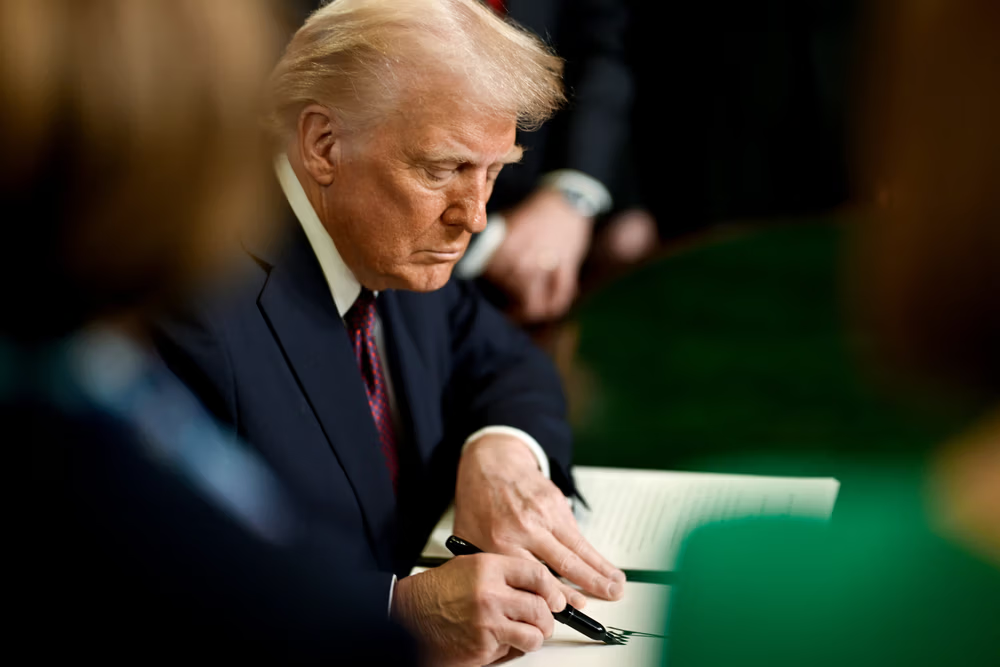U.S. President Donald Trump signed a proclamation Wednesday evening imposing new travel restrictions on several countries, citing national security risks. The directive will fully restrict entry of nationals from 12 countries, while partially limiting travelers from seven others.
The full ban applies to nationals of Afghanistan, Myanmar (also known as Burma), Chad, the Republic of the Congo, Equatorial Guinea, Eritrea, Haiti, Iran, Libya, Somalia, Sudan, and Yemen. Partial restrictions will affect travelers from Burundi, Cuba, Laos, Sierra Leone, Togo, Turkmenistan, and Venezuela.
The proclamation includes exceptions for lawful permanent residents, existing visa holders, certain visa categories, and individuals whose entry is deemed in the United States’ national interest.
A White House official said Trump made the final decision to sign the order following an antisemitic attack in Boulder, Colorado. “He was considering it beforehand, but Sunday’s assault put it into motion faster,” the official noted.
“President Trump is fulfilling his promise to protect Americans from dangerous foreign actors that want to come to our country and cause us harm,” White House Deputy Press Secretary Abigail Jackson wrote on X.
“These commonsense restrictions are country-specific and include places that lack proper vetting, exhibit high visa overstay rates, or fail to share identity and threat information,” she added.
In a video message posted Wednesday, Trump indicated that the list could expand. “The list is subject to revision based on whether material improvements are made. And likewise new countries can be added as threats emerge around the world, but we will not allow people to enter our country who wish to do us harm and nothing will stop us from keeping America safe,” he said.
The new restrictions will go into effect at 12:01 a.m. on June 9, according to the White House.
The proclamation follows an executive order Trump signed on his first day in office directing cabinet members to assess countries with inadequate screening procedures or security protocols. This latest move marks a continuation of Trump’s immigration policies from his first term, during which he instituted a controversial ban on travelers from seven majority-Muslim nations. That policy faced multiple legal challenges before being repealed by President Joe Biden in 2021.
Among the countries now facing a full ban is Afghanistan, raising concerns for Afghans who supported U.S. operations during its 20-year presence in the region.
Many already face uncertainty due to earlier executive orders that suspended the U.S. refugee admissions program and funding for Special Immigrant Visa (SIV) holder resettlements.
Shawn Vandiver, founder of #AfghanEvac, a U.S.-based coalition of veterans and resettlement groups, expressed concern over the new directive.
“The travel ban disproportionately affects families and individuals seeking lawful entry into the US,” he said in a statement, calling it “a strategic move, not a response to an immediate threat.”
The decision has drawn criticism from foreign governments and humanitarian organizations.
Venezuela’s Minister of Interior, Justice and Peace, Diosdado Cabello, responded during a government broadcast, saying, “If you’re really that foolish, then go to the United States,” Reuters reported. “Being in the US is a big risk for anyone, not just Venezuelans,” he added.
Oxfam also condemned the proclamation. “This marks a chilling return to policies of fear, discrimination, and division,” said Abby Maxman, President and CEO of Oxfam America.
She warned that the policy will block individuals and families fleeing war and persecution from entering the U.S., “forcing them to remain in dangerous conditions.”





